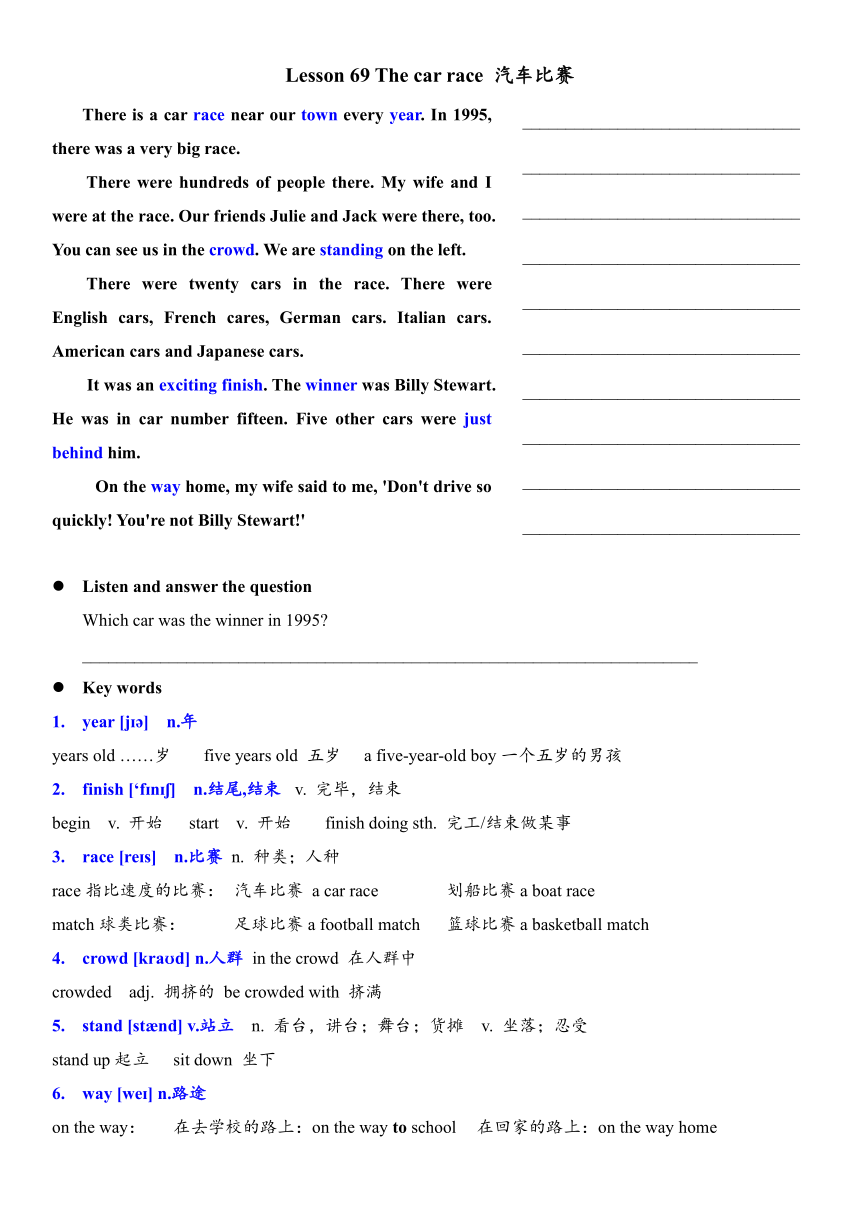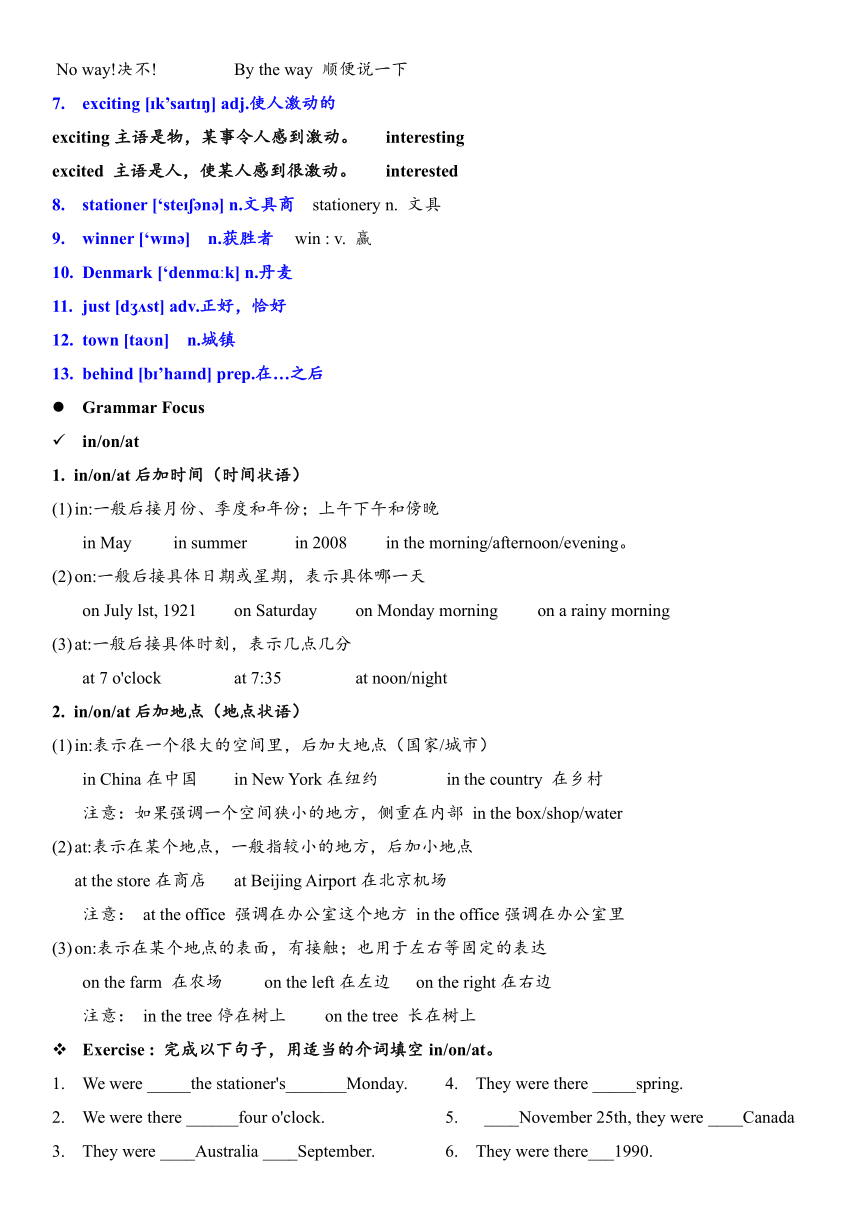新概念英语第一册Lesson 69-70讲义
文档属性
| 名称 | 新概念英语第一册Lesson 69-70讲义 |  | |
| 格式 | docx | ||
| 文件大小 | 23.6KB | ||
| 资源类型 | 教案 | ||
| 版本资源 | 新概念英语 | ||
| 科目 | 英语 | ||
| 更新时间 | 2024-05-24 15:59:22 | ||
图片预览


文档简介
Lesson 69 The car race 汽车比赛
There is a car race near our town every year. In 1995, there was a very big race.
There were hundreds of people there. My wife and I were at the race. Our friends Julie and Jack were there, too. You can see us in the crowd. We are standing on the left.
There were twenty cars in the race. There were English cars, French cares, German cars. Italian cars. American cars and Japanese cars.
It was an exciting finish. The winner was Billy Stewart. He was in car number fifteen. Five other cars were just behind him.
On the way home, my wife said to me, 'Don't drive so quickly! You're not Billy Stewart!'
________________________________________________________________________________________________________________________________________________________________________________________________________________________________________________________________________________________________________________________________
Listen and answer the question
Which car was the winner in 1995
_______________________________________________________________________
Key words
year [j ] n.年
years old ……岁 five years old 五岁 a five-year-old boy一个五岁的男孩
finish [‘f n ] n.结尾,结束 v. 完毕,结束
begin v. 开始 start v. 开始 finish doing sth. 完工/结束做某事
race [re s] n.比赛 n. 种类;人种
race指比速度的比赛: 汽车比赛 a car race 划船比赛a boat race
match球类比赛: 足球比赛a football match 篮球比赛a basketball match
crowd [kra d] n.人群 in the crowd 在人群中
crowded adj. 拥挤的 be crowded with 挤满
stand [st nd] v.站立 n. 看台,讲台;舞台;货摊 v. 坐落;忍受
stand up起立 sit down 坐下
way [we ] n.路途
on the way: 在去学校的路上:on the way to school 在回家的路上:on the way home
No way!决不! By the way 顺便说一下
exciting [ k’sa t ] adj.使人激动的
exciting主语是物,某事令人感到激动。 interesting
excited 主语是人,使某人感到很激动。 interested
stationer [‘ste n ] n.文具商 stationery n. 文具
winner [‘w n ] n.获胜者 win : v. 赢
Denmark [‘denmɑ k] n.丹麦
just [d st] adv.正好,恰好
town [ta n] n.城镇
behind [b ’ha nd] prep.在…之后
Grammar Focus
in/on/at
in/on/at后加时间(时间状语)
in:一般后接月份、季度和年份;上午下午和傍晚
in May in summer in 2008 in the morning/afternoon/evening。
on:一般后接具体日期或星期,表示具体哪一天
on July lst, 1921 on Saturday on Monday morning on a rainy morning
at:一般后接具体时刻,表示几点几分
at 7 o'clock at 7:35 at noon/night
in/on/at后加地点(地点状语)
in:表示在一个很大的空间里,后加大地点(国家/城市)
in China在中国 in New York在纽约 in the country 在乡村
注意:如果强调一个空间狭小的地方,侧重在内部 in the box/shop/water
at:表示在某个地点,一般指较小的地方,后加小地点
at the store在商店 at Beijing Airport在北京机场
注意: at the office 强调在办公室这个地方 in the office强调在办公室里
on:表示在某个地点的表面,有接触;也用于左右等固定的表达
on the farm 在农场 on the left在左边 on the right在右边
注意: in the tree停在树上 on the tree 长在树上
Exercise : 完成以下句子,用适当的介词填空in/on/at。
We were _____the stationer's_______Monday.
We were there ______four o'clock.
They were ____Australia ____September.
They were there _____spring.
____November 25th, they were ____Canada
They were there___1990.
there be的一般过去时
1.构成:There be+(was/were)+ 地点
2.用法:有 (1)拥=have(不和have同时出现) (2)存在There be
3.分类: There was +a/an+单数名词 There was +不可数名词 There were +some+复数名词
4.句型结构(注意就近原则-近视眼)
肯定句:There were hundreds of guests in the hotel during May 1 st.酒店在五一期间有很多客人。
否定句:There were not /weren’t hundreds of guests in the hotel during May 1 st.
一般疑问句:Were there hundreds of guests in the hotel during May 1 st
Yes, there were./ No, there weren’t.
Exercise1 : 用there was或there were填空
There isn't a butcher's shop here now, but____________one here in 1996.
There aren't any people here today, but______________some here on last Monday.
____________hundreds of children here at 6:00, but there aren't any here now.
____________a dairy in our village in 1960 ,but there isn't one here now.
Exercise2 : 单项选择
( )1.There_________any rice in the bowl.
A.are B.is C.isn't D.aren't
( )2.There________many apples on the tree last year.
A.was B.were C.are D.is
( )3._____is there on the table
A.How many apples B.How much bread C.How much breads D.How many food
( )4.-What did you see in the basket then -There______a bottle of orange and some oranges.
A.is B.are C.was D.were
( )5.There____pencil-box, two books and some flowers on the desk.
A.is a B.are some C.has a D.have some
Sentence Patterns
句型1:When were they there They were there on Monday.
句型2:Where were they in July We were in Australia in July.
Exercise : 模仿例句提问并回答。
Sam and Penny/the stationer's /Monday
When were Sam and Penny on Monday They were at the stationer’s on Monday.
you and Penny/Australia/July
Where were y and Penny in July We were in Australia in July
you and Susan/the office/March 23rd_____________________________________________________
Sam and Penny/India/1986_____________________________________________________________
you and Penny/the baker's/Saturday______________________________________________________
Sam and Penny/Canada/1993____________________________________________________________
you and Penny/Austria/August___________________________________________________________
Sam and Penny/home/May 25th__________________________________________________________
you and Penny/Finland/December________________________________________________________
you and Sam/school/February 22nd_______________________________________________________
Culture Land
和英国人交流的注意事项
英国人崇尚绅士风度和淑女风范,讲究女士优先。在日常生活中,英国人注意仪表,讲究穿着。男士外出进行社交活动,都要穿深色的西服(suit), 但忌戴条纹的领带(tie)。女士则习惯穿连衣裙(dress)。
英国人见面行握手礼(handshaking)。切勿与英国人交叉握手,因为那样会构成晦气的十字架形状,也要避免交叉干杯。在商务谈判(business negotiation)中,英国人说话、办事,都喜欢讲传统,重程序,十分看重谈判对手的身份(status)、风度(demeanor)和修养(culture)。英国人同别人谈话时,不喜欢距离过近,一般保持50厘米以上为宜。
在英国,非工作时间就是私人时间,一般不进行公事活动,若在就餐时谈及公事更会犯大忌而使人生厌。英国人送礼一般会选择价格不贵但有纪念意义的物品,高级巧克力、名酒和鲜花等都是英国人的最爱之物。
不要随便将任何英国人都称为英国人,一般将英国人称为不列颠人或具体称为英格兰人(Englishman)、苏格兰人(Scots)、威尔士人(Welsh)等。
参考译文
在我们镇子附近每年都有一场汽车比赛。1995年举行了一次盛大的比赛。
许许多多人都去了赛场。我和我的妻子也去了。我们的朋友朱莉和杰克也去了。你可以在人群中看到我们。我们站在左面。
参加比赛的有20辆汽车。有英国、法国、德国、意大利和日本的汽车。
比赛的结尾是激动人心的。获胜者是比利.斯图尔特。他在第15号车里,其他5辆汽车跟在他后面。
在回家的途中,我妻子对我说:“别开得这样快!你可不是比利.斯图尔特!”
There is a car race near our town every year. In 1995, there was a very big race.
There were hundreds of people there. My wife and I were at the race. Our friends Julie and Jack were there, too. You can see us in the crowd. We are standing on the left.
There were twenty cars in the race. There were English cars, French cares, German cars. Italian cars. American cars and Japanese cars.
It was an exciting finish. The winner was Billy Stewart. He was in car number fifteen. Five other cars were just behind him.
On the way home, my wife said to me, 'Don't drive so quickly! You're not Billy Stewart!'
________________________________________________________________________________________________________________________________________________________________________________________________________________________________________________________________________________________________________________________________
Listen and answer the question
Which car was the winner in 1995
_______________________________________________________________________
Key words
year [j ] n.年
years old ……岁 five years old 五岁 a five-year-old boy一个五岁的男孩
finish [‘f n ] n.结尾,结束 v. 完毕,结束
begin v. 开始 start v. 开始 finish doing sth. 完工/结束做某事
race [re s] n.比赛 n. 种类;人种
race指比速度的比赛: 汽车比赛 a car race 划船比赛a boat race
match球类比赛: 足球比赛a football match 篮球比赛a basketball match
crowd [kra d] n.人群 in the crowd 在人群中
crowded adj. 拥挤的 be crowded with 挤满
stand [st nd] v.站立 n. 看台,讲台;舞台;货摊 v. 坐落;忍受
stand up起立 sit down 坐下
way [we ] n.路途
on the way: 在去学校的路上:on the way to school 在回家的路上:on the way home
No way!决不! By the way 顺便说一下
exciting [ k’sa t ] adj.使人激动的
exciting主语是物,某事令人感到激动。 interesting
excited 主语是人,使某人感到很激动。 interested
stationer [‘ste n ] n.文具商 stationery n. 文具
winner [‘w n ] n.获胜者 win : v. 赢
Denmark [‘denmɑ k] n.丹麦
just [d st] adv.正好,恰好
town [ta n] n.城镇
behind [b ’ha nd] prep.在…之后
Grammar Focus
in/on/at
in/on/at后加时间(时间状语)
in:一般后接月份、季度和年份;上午下午和傍晚
in May in summer in 2008 in the morning/afternoon/evening。
on:一般后接具体日期或星期,表示具体哪一天
on July lst, 1921 on Saturday on Monday morning on a rainy morning
at:一般后接具体时刻,表示几点几分
at 7 o'clock at 7:35 at noon/night
in/on/at后加地点(地点状语)
in:表示在一个很大的空间里,后加大地点(国家/城市)
in China在中国 in New York在纽约 in the country 在乡村
注意:如果强调一个空间狭小的地方,侧重在内部 in the box/shop/water
at:表示在某个地点,一般指较小的地方,后加小地点
at the store在商店 at Beijing Airport在北京机场
注意: at the office 强调在办公室这个地方 in the office强调在办公室里
on:表示在某个地点的表面,有接触;也用于左右等固定的表达
on the farm 在农场 on the left在左边 on the right在右边
注意: in the tree停在树上 on the tree 长在树上
Exercise : 完成以下句子,用适当的介词填空in/on/at。
We were _____the stationer's_______Monday.
We were there ______four o'clock.
They were ____Australia ____September.
They were there _____spring.
____November 25th, they were ____Canada
They were there___1990.
there be的一般过去时
1.构成:There be+(was/were)+ 地点
2.用法:有 (1)拥=have(不和have同时出现) (2)存在There be
3.分类: There was +a/an+单数名词 There was +不可数名词 There were +some+复数名词
4.句型结构(注意就近原则-近视眼)
肯定句:There were hundreds of guests in the hotel during May 1 st.酒店在五一期间有很多客人。
否定句:There were not /weren’t hundreds of guests in the hotel during May 1 st.
一般疑问句:Were there hundreds of guests in the hotel during May 1 st
Yes, there were./ No, there weren’t.
Exercise1 : 用there was或there were填空
There isn't a butcher's shop here now, but____________one here in 1996.
There aren't any people here today, but______________some here on last Monday.
____________hundreds of children here at 6:00, but there aren't any here now.
____________a dairy in our village in 1960 ,but there isn't one here now.
Exercise2 : 单项选择
( )1.There_________any rice in the bowl.
A.are B.is C.isn't D.aren't
( )2.There________many apples on the tree last year.
A.was B.were C.are D.is
( )3._____is there on the table
A.How many apples B.How much bread C.How much breads D.How many food
( )4.-What did you see in the basket then -There______a bottle of orange and some oranges.
A.is B.are C.was D.were
( )5.There____pencil-box, two books and some flowers on the desk.
A.is a B.are some C.has a D.have some
Sentence Patterns
句型1:When were they there They were there on Monday.
句型2:Where were they in July We were in Australia in July.
Exercise : 模仿例句提问并回答。
Sam and Penny/the stationer's /Monday
When were Sam and Penny on Monday They were at the stationer’s on Monday.
you and Penny/Australia/July
Where were y and Penny in July We were in Australia in July
you and Susan/the office/March 23rd_____________________________________________________
Sam and Penny/India/1986_____________________________________________________________
you and Penny/the baker's/Saturday______________________________________________________
Sam and Penny/Canada/1993____________________________________________________________
you and Penny/Austria/August___________________________________________________________
Sam and Penny/home/May 25th__________________________________________________________
you and Penny/Finland/December________________________________________________________
you and Sam/school/February 22nd_______________________________________________________
Culture Land
和英国人交流的注意事项
英国人崇尚绅士风度和淑女风范,讲究女士优先。在日常生活中,英国人注意仪表,讲究穿着。男士外出进行社交活动,都要穿深色的西服(suit), 但忌戴条纹的领带(tie)。女士则习惯穿连衣裙(dress)。
英国人见面行握手礼(handshaking)。切勿与英国人交叉握手,因为那样会构成晦气的十字架形状,也要避免交叉干杯。在商务谈判(business negotiation)中,英国人说话、办事,都喜欢讲传统,重程序,十分看重谈判对手的身份(status)、风度(demeanor)和修养(culture)。英国人同别人谈话时,不喜欢距离过近,一般保持50厘米以上为宜。
在英国,非工作时间就是私人时间,一般不进行公事活动,若在就餐时谈及公事更会犯大忌而使人生厌。英国人送礼一般会选择价格不贵但有纪念意义的物品,高级巧克力、名酒和鲜花等都是英国人的最爱之物。
不要随便将任何英国人都称为英国人,一般将英国人称为不列颠人或具体称为英格兰人(Englishman)、苏格兰人(Scots)、威尔士人(Welsh)等。
参考译文
在我们镇子附近每年都有一场汽车比赛。1995年举行了一次盛大的比赛。
许许多多人都去了赛场。我和我的妻子也去了。我们的朋友朱莉和杰克也去了。你可以在人群中看到我们。我们站在左面。
参加比赛的有20辆汽车。有英国、法国、德国、意大利和日本的汽车。
比赛的结尾是激动人心的。获胜者是比利.斯图尔特。他在第15号车里,其他5辆汽车跟在他后面。
在回家的途中,我妻子对我说:“别开得这样快!你可不是比利.斯图尔特!”
同课章节目录
